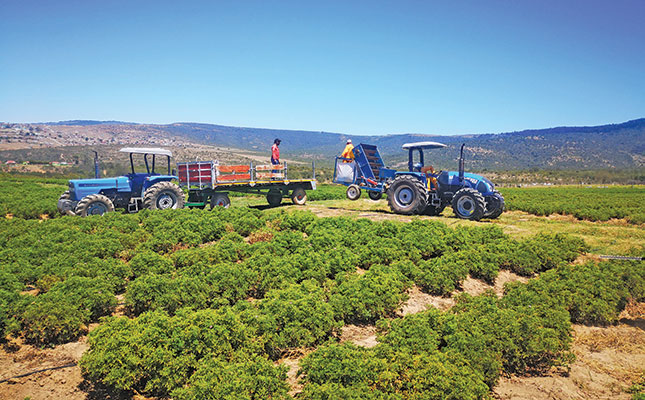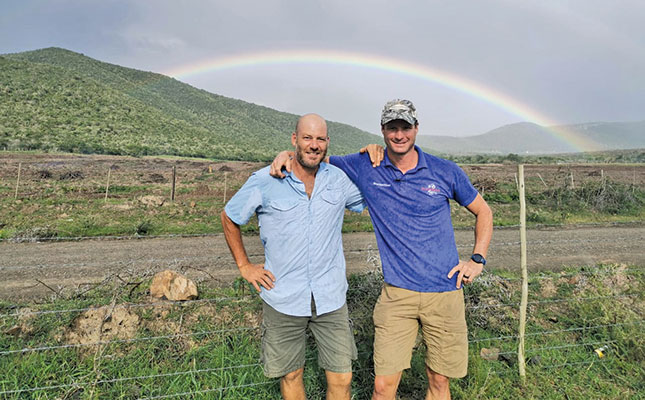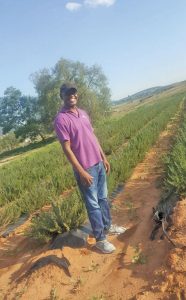Essential oils: a balm for emerging farmers
Qobo Qobo Essential Oils, a non-profit organisation, has teamed up with South African Breweries to establish an essential oil crop venture in the impoverished Keiskammahoek area of the Eastern Cape. The project promises to become self-sustaining within a few years, writes Mike Burgess.

“I’m really attached to this project now. I want it to be a success.”
So says Qobo Qobo Essential Oils (QQ) project consultant Mike Pedersen-Horn, who, along with Dean Lemmer, QQ farm operations manager, is spearheading the establishment of 90ha of irrigated essential oil crops in the marginalised Keiskammahoek area of the Eastern Cape.
Pedersen-Horn, a vegetable farmer from East London, now spends two days a week in Keiskammahoek managing the QQ project, which has already created 40 permanent jobs.

(QQ project consultant) in the Keiskammahoek area of the Eastern Cape. Pedersen-Horn says the advice received from Pietersarel and Elmarie de Bruyn from Herbs-a-Plenty in the Western Cape proved to be an ‘extremely valuable learning experience’.
Hub model
To ensure that emerging farmers gain commercial expertise as efficiently as possible, QQ’s management has based the operation on a hub model. Herein lies its strength, says CEO Tafara Shuro.“The hub model enables highly successful farmers to journey with new emerging farmers in a marginalised community like Keiskammahoek. This is a major breakthrough in agriculture in terms of skills transfer and mentoring. Our projections indicate that the farmers will become profitable within the next three years if we continue having sufficient rainfall,” he explains.

The intiative has by no means been plain sailing, however. QQ first operated as a programme of the Siyakholwa Development Foundation, which was founded by Brian and Jerri du Plessis in 2006 to steer community development in the Keiskammahoek valley.
In 2014, QQ was officially registered as a non-governmental organisation and received funding from the Eastern Cape Development Corporation (ECDC), the Department of Trade and Industry, Old Mutual, and the Development Bank of South Africa.
This was used to establish a central hub comprising land, buildings rented from the ECDC, a distillation unit and implements on the outskirts of Keiskammahoek. Despite this promising start, the project achieved little, says Shuro, mainly due to the incompatibility of short-term funding models and the project’s long-term agricultural goals.
Then, in late 2017, the South African Breweries Foundation agreed to fund the project for a three-year period, which has allowed for the streamlined establishment of eight 5ha plots of drip-irrigated essential oil crops downstream of the state-owned Cata and Sandile dams.
Each plot is run by a farmer, and two more plots will be added by the end of the year.
The funding also allowed for the purchase of machinery and implements, including three 60kW tractors, a plastic mulch applicator, a ridger and a fertiliser applicator, which were essential for establishing the crops, says Pedersen-Horn.
Shuro adds that crop trials are underway at the hub, and a further 30ha of crops will be established to bring the total area under essential oil crops to 90ha.
The hub has benefitted from several recent improvements, which include upgrading the nursery and installing an additional 300kg distillation unit.
According to Pedersen-Horn, convincing local farmers of the long-term value of essential oil crops was initially a challenge, but in time, farmers began approaching QQ to become involved. Sifundo Sebetha, for example, joined the initiative in June 2019 and has bought into the long-term vision of QQ.
“It’s still early days, but farming takes time to make money,” he says. “I believe that after five years there’ll be a smile on my face.”
Establishing crops
Although rose geranium (Pelargonium graveolens), which was pioneered in the region by Du Plessis, is susceptible to frost, the QQ team decided in 2017 to continue with the variety as a predominantly summer crop.
Cuttings were therefore taken from a remaining 1ha rose geranium plot planted by the Du Plessises, and today, 13ha of the crop have been established. These plantings were established at a density of 20 000 plants/ ha instead of the prescribed 40 000 plants/ha to improve ventilation and minimise geranium yellowing and fungal infections.
However, because of a decrease in the international price of rose geranium oil, it has been decided not to increase plantings of the crop.
Instead, the team has increasingly turned to rosemary (Salvia rosmarinus) not only for essential oil, but as a dried herb for the culinary and preservative market. Currently, 28ha of the crop (at 20 000 plants/ ha) have been established in Keiskammahoek, of which 20ha are organic.
The advantages of rosemary include frost resistance and the fact that it can be harvested for up to 10 years, in contrast to rose geranium, which is productive for a maximum of four years.
Pedersen-Horn admits, however, that producing organic rosemary, which is fertilised with chicken manure, has proved a challenge, mainly due to infestations of insects, including crickets, which ringbark the plants despite the application of accredited treatments.
QQ has also established trial plots of Cape helicrysum (Helichrysum odoratissimum) (1ha) and Cape chamomile (Eriocephalus punctulatus) (1ha), from which oil has already been produced. Trials of three non-indigenous crops, Vetiver grass (Chrysopogon zizanioides), lavandin (Lavandula x intermedia) and thyme (Thymus vulgaris), are due to be launched in spring.
Production of the oil
Two tractor-drawn harvesters that trim the tops of the plants are used to harvest biomass for essential oil distillation. The recently upgraded distillation facility, with two 1t pots and a more efficient 600kA/hour flash-type Vapomat boiler, produces on average 1,2ℓ of oil (1kg) for every ton of biomass.
A smaller, 300kg distillation unit is used to produce oils from smaller volumes of chamomile and helicrysum.
QQ’s products are analysed and tested by Dohne Agricultural Research Institute and the Council for Scientific and Industrial Research. They are 100% pure, concentrated essential oils that are not diluted with carrier oils, and are on par with the best in South Africa, says Shuro.
By far the bulk of QQ oil is marketed via agents for the international and local medicinal, perfume and lotion manufacturing sectors.
Unfortunately, this market is influenced by turbulent international price fluctuations determined by global supply trends.
For this reason, explains Shuro, QQ has begun focusing on a more lucrative, yet currently limited, market: retail consumers via the WooCommerce platform on the organisation’s website, qoboqobo.co.za.
The oils are sold in 10ml and 20ml bottles and earn QQ R12 000 for 1kg of oil, as opposed to the bulk sale of 1kg of oil for R3 000. It is hoped that this increased revenue will help the local farmers achieve sustainability by 2023.
Phone Mike Pedersen-Horn on 076 792 9862.
